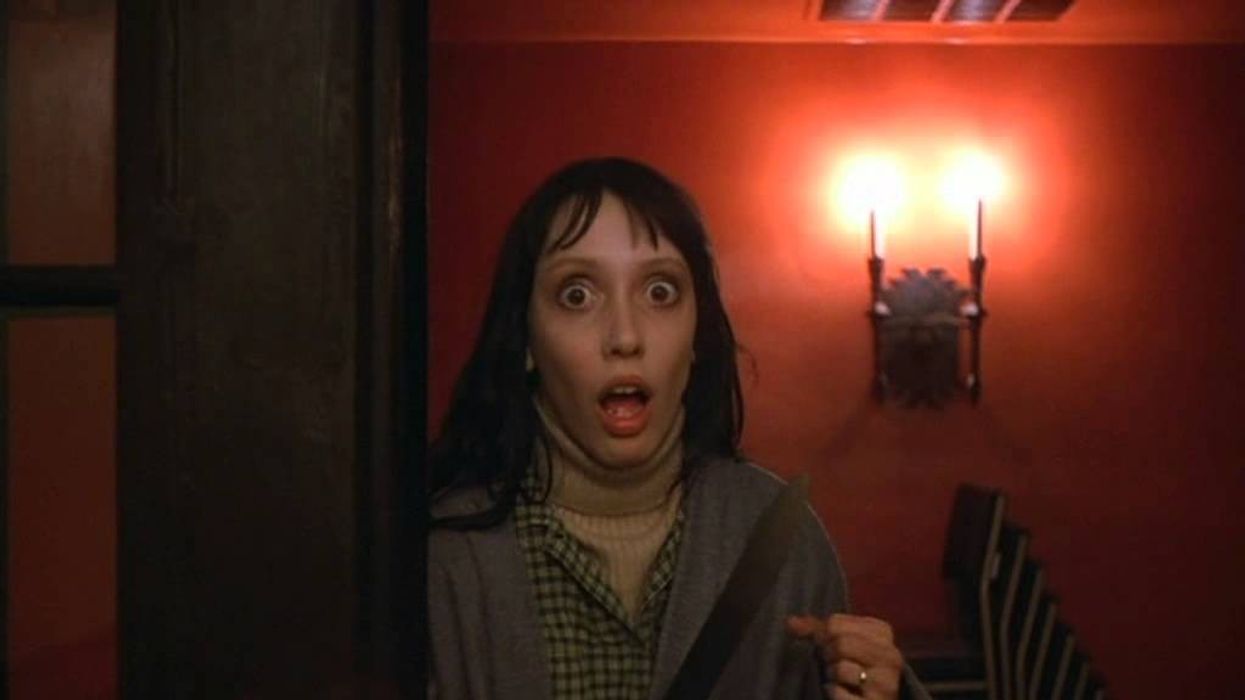Watch: 4 Definitive Reasons Why 'The Shining' is the Best Horror Movie of All Time
Just in time for Halloween, we revisit the genius of Stanley Kubrick's 1980 opus 'The Shining'.

It is, ontologically, something of a fool's errand to think that, outside the realm of sports and homework, it's possible to arrive at an objective "best" anything, and this is especially the case with art, and more so with films, which arouse powerful emotions, and to which people bring all of their unique experiences, aesthetic preferences, preconceived notions, etc.
The Shininghowever, might be the perfect genre film, even as it totally eschews almost every convention of said genre. This video from Jack's Movie Reviews lists some reasons why this story of a family's winter in a cozy mountain retreat might make for the best horror movie ever. Check it out below and read on for a breakdown of our top four.
1. Inevitability
Speaking about the film, Martin Scorsese is quoted in the video: "You know that something is building up in this place. It's holding back this extraordinary dramatic punch that's going to happen. You know it's going to come somehow, at some time..." and indeed, the film breaks one of the genre's (one of Hollywood's, really) key rules in the way that it refuses to play by the rules of psychological realism. We are in the realm of Freud's "The Uncanny" and Bettelheim's Uses of Enchantment, two texts Kubrick and collaborator Diane Johnson consulted while writing the script. The Shining is, in a way, a fairy tale, though a fairy tale as the Brother Grimm would have written it, not as it would have been adapted by Disney.
Kubrick also does a great deal of visual signposting (not surprising, as he was one of the most purely cinematic of the big Hollywood directors.) From the framing of shots that feature knives over Danny's head, to the way Jack's isolation is communicated visually: after the beginning of the film, it's rare to see Jack with either Wendy or Danny, "and on those rare occasions," says Jack's Movies Reviews, "if they are in the same frame, one is the foreground....one is an afterthought in the background."
2. Dramatic Irony
Building on the first reason, the film's use of Dramatic Irony, or, the sort of irony where "the audience knows something that the characters don't," is exemplary, and this variety of the ironic has been used to savage effect for thousands of years, from the climax of Oedipus Rex to ;Macbeth and on and on. It is a way of unifying the story and the audience, and "creating horror through inevitability."
We, in the audience, know that the protagonists are going to be cut off from the outside world, and that Jack is going to go insane, but, because the film follows the logic more of a dream than real life, the characters do not respond to this information in the way they would in a psychologically realistic work.
3. Tension
After what Jack (video Jack) refers to as an "information overload in the first thirty minutes of the movie," the section where we are led around the hotel at a brisk pace, learning the layout (kind of), the film abruptly switches gears and goes into a long section where we withdraw and observe the family going about their daily lives in the hotel. Nothing happens, per se, but, as mentioned before, Jack does begin to distance himself from the family, quietly losing his grip, and all while the Steadicam "seems to glide around," having "a mind of its own," almost like the consciousness of the hotel.
"The longer it takes for tension to be built, the more effective that tension becomes."
Nothing really "happens" until about forty-five minutes into the film, and it's much longer than that before Jack really begins to go haywire. But, as Jack says in the video, "the longer it takes for tension to be built, the more effective that tension becomes." By this law, ;The Shining is one of the most suspenseful films ever.
4. Music
Kubrick changed the game in Hollywood when he started to use existing pieces of music for his films, rather than commissioning original scores from composers who, he felt, were probably not as good as Beethoven. In The Shining, he makes exemplary use of both the music of Ligeti, as well as the talents of Rachel Elkind and Wendy Carlos, quoted here saying that their music, composed for analog synthesizer "creat[es] an unnatural feel, lots of background patterns and textures with heartbeats and sizzling electronic little weird sounds," sounds that add to the overall dread of the film.
And then there's the opening credits. Set to the music of Hector Berlioz'Symphonie Fantastique, the sequence manages to not only defamiliarize a placid lake and mountains, but create an active foreboding, a tone maintained throughout the rest of the film, even when nothing "scary" is happening. Kubrick also throws lots of almost subliminal hints our way, e.g. the "Shone" sounds, which, if you haven't heard them before, then check them out. They're real, and they're weird, and Kubrick definitely put them there just to make you feel that much more uneasy, without you knowing why.
The thing about this film (for those who enjoy it, which I do) is that it really is a gift that keeps on giving, rewarding viewings with new insights, but never giving up its secrets. To paraphrase Abraham Lincoln, you can't scare all of the people, all of the time. But, you can scare some of the people, and The Shining does its best.
This video lays out a convincing case for the terrifying genius of Kubrick's film, which, if you haven't seen it, stop reading this article (well, finish it, then read one more), and then go check it out for yourself. There's no better time of year to do it.
Source: Jack's Movie Reviews











